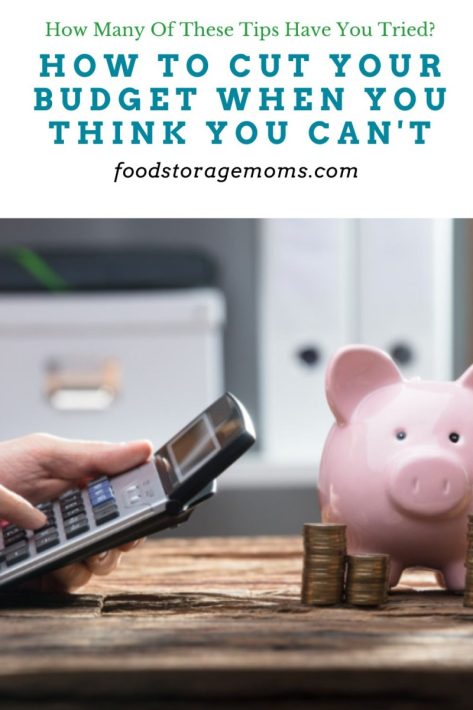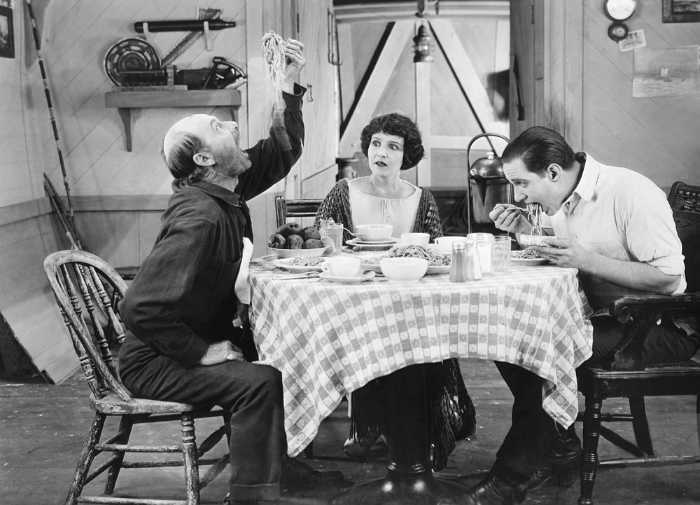How To Cut Your Budget When You Think You Can’t
It’s no secret we all need a budget to help us stay on top of our financial goals. Whether you make $10.00 or $100.00 an hour or more, it doesn’t matter. Everyone needs to make a budget based on their income and offset by their monthly expenses. First, write down the income you bring in after taxes. If you are 1099’d, set aside enough money to pay your taxes when you get paid, not a year from now. I’m updating this post from September 2018. Budgeting is still the name of the game. Savings Envelopes

Let me explain if you don’t know what a 1099 form is. Some people, such as independent contractors, are paid the whole amount due to them for their services without having any taxes taken out of their paycheck. Yep, if you’re one of those people, you need to plan and be ready to pay those taxes when they are due. Set up a savings account now and set the money aside. And while you’re at it, set up a savings account for you and your family for other things, like a vacation, college fund, funds to cover co-pays for medical expenses, etc.
Savings Account
Wait, you may think there is no way I can put any money in a savings account right now. When Mark and I were first married, he was in college, and soon we were expecting our first child. We both agreed that I should be home with our baby girl. We also realized it would take some work to cut our expenses because I would no longer have a paycheck.
I decided I could use my sewing machine. If people needed something sewn, I could do it for a small fee. I also took in ironing—wow, no one irons much these days. Then, I babysat for mothers in the neighborhood who needed someone to watch their kids. It was hard, but I knew I didn’t want to work outside the home. I also love children, so I was anxious to help other working mothers.
Mark worked an extra night job or two, and we could soon see we could do it. Yes, it was hard work, but it was worth it. And we put him through school without any student loans.
Your Personal Finance Goals Are Critical
Inflation over the past few years has been hard to deal with. A lot of money is being spent on food and housing. With the increase in the cost of home ownership, those mortgage payments are keeping many of the younger generations from buying a home. Interest rates have been kept high by the Federal Reserve in an effort to fight inflation. Hopefully, we’ll see lower interest rates this year and going forward.
Just like I’ve told my readers to have an emergency plan in place for food, water, and many other things, it’s also important to have goals and plans set up to protect your financial situation now and in the future. A family budget is one step in making that plan work. Only we can control our spending habits and make sure impulse purchases and unnecessary transactions don’t make it hard to cover our fixed expense items and normal household expenses each month. Putting together a formal budget on paper makes sense. If you have computer skills, an Excel spreadsheet is an effective way to put things in place.
1. Put Your Budget Into Written Form
I wish schools and churches would teach our youth how to make a budget and put it in writing like a roadmap. This is where we are right now and where we want to be. We have all heard the statement you can’t squeeze blood out of a turnip; I get it. Seeing things written out makes it easier to visualize, understand, and remember how the numbers come together.
2. Find A Way To Bring In More Income
So, we must make tough decisions: where can we cut expenses, and how can we bring in more income? It’s as simple as that, or is it? It’s hard to think about getting another job or cutting our cable, internet, or gym membership bill.
3. Write Down Expenses and Income
First, don’t be harsh on yourself; this will help the entire family learn to live on less and work harder. It’s okay, you can do this, I promise. I’m going to list a few places where I could cut expenses. Please write down your income as I mentioned above. Grab a piece of paper and write it down. Now, write down all of the expenses you’ll face this month. Of course, our rent or house payment will be the first to pay, and then our utilities. Then list your car payment, car insurance, homeowner’s insurance, food, clothing, school loans, etc.
4. Set Up A Savings Account
Please set aside at least $10.00 every paycheck for your savings account as a starting point, more if you can afford it. You won’t miss it if you set it up by automatic payment. Please start small and it will add up faster than you think. You can skip eating out or your soda pop run. In the end, having a few bucks in the bank is fantastic!
5. How To Cut Expenses/Wants or Needs
This is a long list of ideas to help you cut expenses; they may or may not pertain to your situation. But we need to think out loud about how to cut our spending.
- Put money in envelopes to help you budget for groceries, haircuts, clothing, eating out, medicine, Doctor/Dentist visits, and dog grooming (for gas, I use my debit card)
- Cut your own family’s hair
- Eat at home every meal, if possible (consider sending a sack lunch with the school kids unless school lunch is cheaper)
- Cook from scratch
- Stay out of stores unless you really need something – then use a shopping list
- Turn lights off when you leave a room to reduce your electricity bill
- Keep the blinds closed on those hot days to help with utilities – get a programmable thermostat and adjust the temperatures for when you’re home and when you’re gone
- Unplug electronics and small appliances that are drawing electricity when not in use – run your dishwasher, washing machine, and clothes dryer less often. Wait until you have a full load
- Skip the pedicures or manicures
- Stay away from the corner soda pop stores
- Do you have a landline and a cell phone, can you cut one?
- Get a clothesline and hang your sheets to dry to save on natural gas or electricity
- Can you cut your entertainment expenses?
- Can you downsize your house or apartment or get a roommate for that spare bedroom?
- Cut your food bill by growing a garden
- Cook less expensive meals – look for store-brand items rather than name-brands
- Pack lunches with leftovers; even you and your spouse can take lunch to work
- Buy little if any, convenience foods
- Make your bread
- Can you trade your car in for a less expensive car or truck?
- Use coupons wisely, sometimes you can get a gallon of milk if you buy a box of cereal
- Watch for meat that is slashed in price – many store discounts are available with coupons
- Watch sales and shop at cheaper stores, if possible
- Ditch cable or cut it way down if possible; look at Hulu and Netflix
- Skip the monthly subscriptions to magazines
- Go to the library and get movies, hard-copy books, or audible books
- Use cash whenever possible; when it’s gone, it’s gone
- Track what you spend, and write down everything you spend money on
- Sell items in your house you are not using or may never use (extra income) it also makes you think twice about spending money on things you don’t need
- Cash is self-control; it takes some work but is so worth it
- Have fun going on cheaper dates
- Cut lessons if you can’t afford them
- Get help if you can’t afford groceries; food stamps are there for short-term use to help people.
- Save gas in your cars by planning those trips to town, combining all the errands into one trip
- Janet a reader suggested: “Another thing is that after you pay off the car, keep it longer than you might have in the past, and put the money in a savings account for when you buy a new car. Cars depreciate so much. It’s the worst investment you can make, but it’s necessary.”
6. Budget With Envelopes
Leanne reminded me to set up equal pay with monthly utility bills. I have always done that, and I take it for granted. It’s incredible because there are no surprises like high bills!! Often you’ll pay less if they can take the payment from your account automatically.
Groceries
$50.00 dollar bills (set your budget and put large bills in your envelope); if you go to the grocery store, you put the change in your grocery envelope. For instance, if your budget is $300.00 and you spend $80.00, you place the remaining $220.00 back in the envelope for the next grocery shopping day.
Haircuts
$5.00, $10.00, and $20.00 bills, fill the envelopes tagged with each person’s haircut. For instance, Mark’s haircut is $25.00, including a tip, so I put $25.00 in one envelope. My haircut is $60.00 every four weeks so I have two envelopes, one for Mark and one for me. My envelope has $60.00 in it.
Clothing
$20.00 bills (set your budget and stick to it) Once you realize how much you are spending out of your envelopes, you will cut back big time because the cash is gone. It’s hard in the beginning, but you can do it.
Get Out Of Debt – Have a Debt Management Plan
Pay off your car immediately, and buy a cheaper car if necessary. Get by with one car if you can. Don’t carry any credit card debt. If you have credit card debt, pay more than the monthly payment. Debt owns you. Don’t buy stuff just because you want it; consider what you need.
If you have a lot of high interest rate debt consider a debt consolidation loan. With rates anticipated to drop over the next year, consider a variable rate loan so the payment will go down over time.
Final Word
Please let me know how you have learned to cut expenses and cut your budget. I would love to hear your thoughts and ideas. We learn from each other. May God bless you and your family for being prepared for the unexpected. Staying out of debt makes us more self-reliant. We can cut our budget even when we think we can’t. Linda
Copyright pictures: Piggy Bank: AdobeStock_79298456 by Rob Hyrons, Budgeting with a Calculator AdobeStock_189738154 By Andrey Popov






















Good points. I will add cook from scratch. I wanted a house phone along with my cell phone, so I got a magic jack. Very inexpensive. Being retired, we go most places together, but on the few times that one of us goes alone, we want to be able to call.
Another thing, is after you pay off the car, keep it a long time, and put the money in a savings account for when you buy a new car. Cars depreciate so much. The worst investment you can make, but necessary.
Hi Janet, I need to add your comment to keep your car for a long time and save money for the next car. Mark and I have had one car since 2009 and we have money in the bank waiting to find our next car. We are in no hurry. Our car is a Honda CRV and has given us great service. Yay! Great comment! Thank you!! Linda
Thanks, Linda, you’ve got me thinking. One of my bad habits is to leave the house hungry when I am off to do chores. I just made myself a yummy fried egg sandwich instead of going through McD’s! Yay!
I also keep lots of bottled water in the car in case someone is thirsty – that way we don’t have to go through a drive-through for a sugary drink.
Thanks for all that you do.
Hi Kathy, you are so cute!! You are thinking before you spend your hard-earned dollars. Now, I need to go make a fried egg sandwich, that sounds so yummy!! Happy Sunday! Keep up the good work! Linda
I also agree about sharing a car. My husband and I are retired and do share a car. Occasionally, I take a trip to either of my sister’s home for a visit. When I do, I rent a car and pay for the same insurance coverages as would be on the car that we share. This leaves our shared car at home for my husband and we only have extra car expenses when I travel not by the year for insurance and maintenance.
Hi Carol, oh I’m so glad you share a car!! I have mentioned to people who are struggling with expenses and they can’t visualize only having one car. If we had kids at home with lessons and I was working I would get another car. But I’m not working outside the home or have kids to drive to lessons. I use Uber if we get in a real pinch but that’s rare. Kudos to you and your husband! Keep up the good work! Linda
Just looking at your list, and your picture! I love your cute haircut, but if I were on a tight budget, I would have to consider a different hairstyle! No way would my budget allow for a haircut that had to be redone every two weeks! I changed my hairstyle so I can go 6-8 weeks between haircuts and still keep it looking good. Just a thought.
Hi Deb, you are so right my friend. LOL!! I used to go every six weeks when I was working and my hair was longer. I had to find a cheap place to get my hair cut every two weeks. I have to laugh the barber that cuts my hair said he has never seen so many cowlicks! As my hair has gone from gray to white, has it changed! It starts sticking out every which way so that’s why I had to go to a very short haircut, much shorter than my picture. Which reminds me, I should get a new picture. I always love your comments, thank you! Linda
Linda ~
I would add checking with your utility company about the Budget Plan. I love having really low electrical bills in the summer but on a fixed income, the high bills in the winter were killers! So, I inquired about the Budget Plan and now pay the same amount every month. Much easier to budget when you know how much you will need to pay before the bill arrives! If I see that I am going way over during the winter (i.e. my budget plan is $58 per month but my usage, say in January, shows I would normally owe $78, I pay a bit extra. This is not necessary but I would rather have a few dollars over than a lot under!!).
Hi Leanne, you know I take for granted people set up the budget plan. I have always put it on the monthly equal pay! I need to add this to the list!! Thanks for the reminder! Linda
I do set up a plan that I control.
My auto insurance, homeowners insurance, property taxes, propane costs, are saved monthly with the SS check in envelopes.
I cancelled garbage pickup and cell phone to cover homeowners increase.
The water, phone, electricity are paid ahead by a few months.
My checking account statement is sort of funny looking at the cancelled check page.
One check..the mortgage.
I usually cash out any money from the SS check. No money in the bank. And that money is used to pay ahead those utilities.
Yes, I pay the institutions with cash.
Any leftover is kept in an envelope labeled ‘surplus’ because there is always something breaking or needing repair and it isn’t much.
I just need to know that money is there when those bills come due. No guessing. It’s there. I know the SS amt. and don’t have any left to budget.
But, God is good.
Hi JayJay, you are so right God is good! I have heard car and home insurance costs are rising because of crime, theft, and of course weather related costs. I love your idea, one check for your mortgage on your bank statement! Good job! Linda
This is always a good post!! Everyone has such good ideas and stories about how they manage their money.
One thing that everyone needs to have included in their budget is an Emergency Fund – this would have been grandma’s cookie jar or coffee can where extra money is put (sort of like JayJay’s surplus envelope).
Years ago, I was living paycheck to paycheck. Sometimes I only had $20-30 left over at the end of the month. Then I took a course on budgeting and using a cash system. I was searching for ways to spend less! One of the things I did when I made up my budget was to FIRST put aside some funds just for emergencies. I started with not spending $5 bills! That added up fast. I put every $5 bill that I had after making a purchase, in an envelope. When I had $50, I opened an interest bearing savings account – this was back when banks actually paid a decent interest! Then I saved those $5 bills again until eventually (took months) I has $1000 in savings for emergencies. I did not touch that money unless it was something like car repairs, washer/dryer issues, etc. I still have an emergency fund but it has grown significantly. Again, this is money that is not used for day to day, month to month spending. It is ONLY for emergencies.
Hi Leanne, oh you always have the est comments! Having an emergency fund is critical! And yes, $5.00 does add up over time. By the way, now banks are paying 4.5% for six months if you keep your savings in there. It’s not a CD Certificate of Deposit, there’s a $25.00 w/d fee if you withdraw early. It’s taken 2-1/2 years to build our house (so when we sold our house we knew which bank to put the proceeds). LOL! I worked in a bank and we never had rates like this except back in the 70s! We all need some surplus for emergencies, nailed it! Linda
What banks, Linda? My credit union pays 6.17% on the first $500 in Savings but after that, it drops to 0.16%
Hi Leanne, in Utah we have a few banks, not Zions Bank, but Key Bank and Chase do depends on the balance. Typic%ally most banks do not pay that much. We put our money in the bank 2-1/2 years ago and we are still earning 4.5%. Once the balance gets below a certain amount we will earn less. But we had the proceeds from the sale of our home, that’s a big difference. Our house is still not done. Yes, it’s ridiculous, it’s a 1000 square foot home with an oversized shop for my SIL. We do have an upstairs (1000 square feet) open room for family get togethers or guests, separate entrance. Hopefully it’s done by Memorial Day. Linda
All great points, and most I already follow. The one I really need to act on now is emptying out and selling all extra items we have stored away that we don’t need. One thing we do for our food budget is we have a local farmer that we buy a side of beef and a whole pig from every year. He has a preferred butcher that packages it all up to our specifications and that takes care of all the beef and pork our family needs for a whole year, far cheaper than what is in the stores and better tasting as well. We had to invest in a couple of chest freezers so there is some up front cost, and we also have to pay at one time for a year’s meat, but it’s been worth it these last few years. We also buy in bulk a lot of our staples from a local Amish market, and that saves us a lot of money as well.
Hi Tracy, oh I love hearing this, years ago we would buy a side of beef. Oh and a whole pig would be awesome as well. I’m hoping to buy a side of beef from a Farmer south of us. We are building a small home but we have a space ready for a new freezer. I remember it seemed like a lot of money upfront but in the long run we save money for sure. I wish we had an Amish store near us. We have a company called Azure it has some good buys for buying in bulk. Great comment, Linda